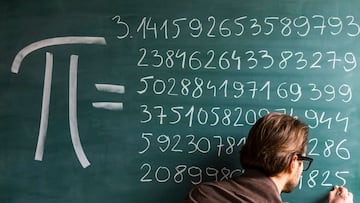Pi Day: what is it and why is it celebrated on 14 March?
We’ve done full circle as this special day in the calendar comes around again, one where we celebrate a rather important number.


Did you wake up today, 14 March and wonder why Pi Day was trending? Well, you weren’t the only one, so let me round things up for you. Yes, puns may follow.
What is Pi?
Very simply, it’s a number and that is approximately 3.14159, but its decimal representation goes on infinitely without repetition. (If you want to see the first 1,000 digits of pi). It also has a symbol, and that is ‘π’. I’m guessing you want more so let’s go a little deeper and find out where Pi sits in the circle of life.
Happy Pi Day. pic.twitter.com/36KGEAQDV0
— StatMuse (@statmuse) March 14, 2023
Pi is a mathematical constant that represents the ratio of the circumference of a circle to its diameter. It is an irrational number, meaning it cannot be expressed as a finite decimal or fraction, and it has an infinite number of decimal places, driving some students round the bend as they continue in a vicious circle. It has been studied for thousands of years and is a fundamental constant in mathematics and physics. It is used in a wide variety of mathematical and scientific calculations, including geometry, trigonometry, calculus, and more.
As the sporty graphic above shows, you can keep going as far as you want. If your particular want is 100 digits, you’d be after 3.1415926535 8979323846 2643383279 5028841971 6939937510 5820974944 5923078164 0628620899 8628034825 3421170679. That’s pretty accurate.
Can you solve NASA's Pi Day challenge? https://t.co/miaYh9uts5 pic.twitter.com/NoGxUubPav
— SPACE.com (@SPACEdotcom) March 14, 2024
The symbol for pi was first used by Welsh mathematician William Jones in 1706, but the value of pi was not calculated accurately until many years later. Modern computing has managed to calculate its value to trillions of decimal places.
For #PiDay this year, we turned numerals seen around campus into an irrationally beautiful collage. Best wishes to everyone for a day filled with pi(e)!
— Massachusetts Institute of Technology (MIT) (@MIT) March 14, 2024
Image: Jose-Luis Olivares/MIT pic.twitter.com/signwmYkvq
Why do we celebrate Pi Day on 14 March?
You may be ahead of me here if you’ve been paying attention. Given the above number we commemorate Pi Day on March 14th due to March being the third month and the first two decimal places being 14, hence, 3/14*.
Physicist Larry Shaw hosted the inaugural Pi Day celebration at the San Francisco Exploratorium in 1988. Since then, Pi Day has developed into an annual celebration of mathematics and science that includes events and activities held in educational settings like museums and schools.
*Note: although in the US the date format has month/day/year, in many countries around the world the order is day/month/year.
The first one thousand digits of pi visualized in MATLAB 🥧 #PIDay pic.twitter.com/ZV5XLXf4wz
— MATLAB (@MATLAB) March 14, 2024
How can I remember Pi?
My favourite mnemonic for this is ‘how I wish I could remember Pi’ (just count the letters in each word) but there are others.
Related stories
‘May I have a large container of coffee?’ for example, gives the same effect with added caffeine, while you can really show off by making up a phrase like, ‘Sir, I send a rhyme excelling, in sacred truth and rigid spelling, numerals aligned, as digits of pi, with sharpness keen, and most expedient speed, I count them all, for that is what I need.’
Say happy Pi(e) Day to Mincemeat pic.twitter.com/QVElguqaxP
— Fortnite ANZ (@FortniteANZ) March 14, 2024
How can I use Pi?
Let’s circle the wagons and all have a look at what Pi can help us with. Here’s a handy little video tutorial but if you have any further questions, drop me a note in the comments and I’ll get you an answer.
Complete your personal details to comment